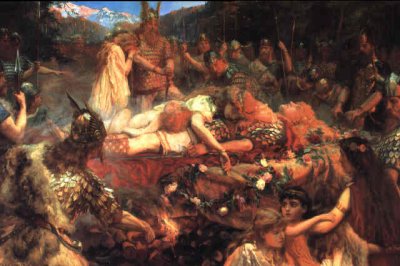
February 11, 2013, by Christopher King
Viking ancestors: fact and fiction
With racism in the news it is perhaps time to look at one of the most persisting misconceptions about the Vikings: that they were actually a ‘race’. There is nothing ‘ethnic’ about the Vikings and they would have been perplexed to be defined thus. The idea that there is something ‘racial’ about Vikings is often perpetuated by those who want to underline their own (usually white) today. But this has no bearing in serious research.
While many Vikings originated in Scandinavia, there is no evidence that they thought of themselves as a distinct group. Instead they would have had regional identities, and being a Viking may have been more of a job description than an ethnic label. Their contemporaries called ‘Viking’ groups by all kinds of names – including ‘Gaelic-speaking foreigners’ which is one of my favourites. Viking travellers frequently married partners from other places. There is also a large difference between biological identity and ethnic identity – as one of my colleagues says: just because I have a bed from Ikea this does not make me Swedish. It is very clear that the Vikings quite liked pretty things from other places – raiding may not be so much fun if no one knows that you have been abroad. As for cultural practices, well, as the Old English poem Beowulf shows: you do not have to be from Scandinavia to enjoy stories about Swedish heroes.
Some modern people identify themselves as ‘Viking’ because their ancestors migrated from Scandinavia and because they may have looked at modern DNA studies. Yet while these studies are fascinating and add much to scholarly research, geneticists agree that they should be used with caution. Modern DNA analysis looks at ancestry – but only at one of the strands of the DNA – the one we have inherited from either our fathers if we are men or our mothers if we are women. This blanks out many of our ancestors, all your inheritance from your other parent. It is also clear that we share most of our DNA with all other humans – and other things. I always feel chastened that half of my DNA is identical with that of a banana.

Whilst we understand ‘Viking’ as an activity,it’s interesting that the ransoms payed to ‘Vikings’ were spoken of as Danegeld.
This indicates the ‘Vikings’ were thought of as a people of tribes,although of different tribal groups,a generic identity of Northern peoples.
DNA evidence is unreliable and still in its infancy,but place name evidence and language suggests close links to Germanic tribes of the ‘wícingas’ and the forming of the English nation.
There’s a very useful explanation of what genetics can and cannot tell us by Mark Thomas, professor of evolutionary genetics at UCL, here http://www.guardian.co.uk/science/blog/2013/feb/25/viking-ancestors-astrology?CMP=twt_gu
It is disingenuous to use he term ‘Viking’ when discussing identity,as the above article attempts to do.
If identity is to be discussed,those who claim to be of Germanic/Northern descent have as much right to claim that identity as say,those who claim to be of Iberian descent.
Does the use of DNA ‘evidence’ to disprove a link to an ancestral heritage for some sociatol groups stray too close to a denial of ancestral roots which are already well established?
To go Viking….the first Viking incursions as such beging with Hengest & Horsa…as we know, the founding father of the English. Britain has always been awash with cultures but we can still be proud of our heratige without hating others or being racist 🙂